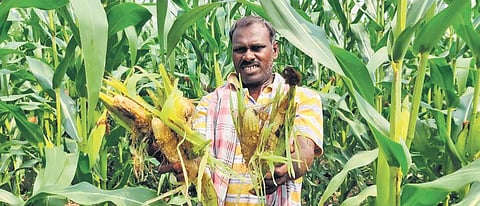

CHENNAI: The state government has constituted a 19-member committee, which includes forest officials, scientists and farmers, to tackle the growing problem of wild boar menace. The committee, headed by Chief Wildlife Warden Srinivas R Reddy, will be meeting shortly and visit the field to get first-hand information on the gravity of the problem and suggest mitigation measures. The DMK government had made an announcement while presenting the agriculture budget 2023-24 in the Tamil Nadu assembly that it would find a solution to the wild boar problem soon.
Recently, Kerala government has allowed culling of wild boars and made panchayat presidents as honorary wildlife wardens to issue orders. Supriya Sahu, additional chief secretary to government in environment, climate change and forest department, said the committee will visit Kerala to study the pros and cons of that decision.
Reddy said human-wild boar conflict is more severe and complex in Tamil Nadu compared to Kerala. “In Tamil Nadu, we have more farm lands unlike Kerala where the conflict landscape is dominated by estates. So, the issue is complex here. We need to take a more pragmatic approach wherein we don’t harm the overall population of the species, and also protect the crops from damage. For this, scientific assessments need to be done. Solutions need to be region-specific.”
Need to be cautious before taking any drastic steps, say experts
For officials said though there is no wild boar population estimation in state, based on factors such as compensation claims and farmers’ complaints, conflict hotspots have been identified. Districts like Krishnagiri, Dharmapuri, Coimbatore, Tenkasi, Thanjavur, Dindigul and Erode are reporting high percentage of crop damage and negative interactions with boars, sources said.
Experts say the government needs to be cautious before considering any drastic measures such as culling. After conducting proper scientific assessment, Kerala carried out mass culling and now the prey base for carnivores has dropped.
While farmers associations are demanding to declare wild boars as ‘vermin’, State Board for Wildlife member Antony Clement Rubin, who is also a member of the joint committee, said, “There has to be a balanced approach. We need to understand whether these are feral pigs or wild boars. Also, options like trapping and release and use of animal repellents can be considered.” T Ramesh, senior scientist, Salim Ali Centre for Ornithology and Natural History, who co-authored a study titled “Factors driving human-wild pig interactions: implications for wildlife conflict management in southern parts of India”, told TNIE, “We cannot conclude that wild boars are coming out of forests and damaging crops due to increase in population. It might be due to habitat degradation inside the forest as well.”
The study carried out in western and eastern ghats, which was published last year, predicts the conflict between people and wild boars could be occurring in around 30% of the total study area, encompassing 16 protected areas. The results showed that people living in fringe areas of the forest encountered the highest number of conflicts (77%) followed by reserve forests and protected areas. There was not much property and deaths; crop depredation (98%) was the problem.
DMK govt had promised to find a solution
The DMK government had made an announcement while presenting the agriculture budget 2023-24 in the Tamil Nadu assembly that it would find a solution to the wild boar problem soon